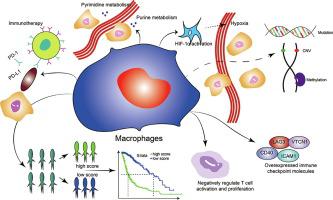当前位置:
X-MOL 学术
›
Comput. Struct. Biotechnol. J.
›
论文详情
Our official English website, www.x-mol.net, welcomes your
feedback! (Note: you will need to create a separate account there.)
The molecular feature of macrophages in tumor immune microenvironment of glioma patients
Computational and Structural Biotechnology Journal ( IF 4.4 ) Pub Date : 2021-08-14 , DOI: 10.1016/j.csbj.2021.08.019 Hao Zhang 1 , Yue-Bei Luo 2 , Wantao Wu 3 , Liyang Zhang 1 , Zeyu Wang 1 , Ziyu Dai 1 , Songshan Feng 1 , Hui Cao 4 , Quan Cheng 1, 5, 6 , Zhixiong Liu 1, 6, 7
Computational and Structural Biotechnology Journal ( IF 4.4 ) Pub Date : 2021-08-14 , DOI: 10.1016/j.csbj.2021.08.019 Hao Zhang 1 , Yue-Bei Luo 2 , Wantao Wu 3 , Liyang Zhang 1 , Zeyu Wang 1 , Ziyu Dai 1 , Songshan Feng 1 , Hui Cao 4 , Quan Cheng 1, 5, 6 , Zhixiong Liu 1, 6, 7
Affiliation

|
Gliomas are one of the most common types of primary tumors in central nervous system. Previous studies have found that macrophages actively participate in tumor growth. Weighted gene co-expression network analysis was used to identify meaningful macrophage-related gene genes for clustering. Pamr, SVM, and neural network were applied for validating clustering results. Somatic mutation and methylation were used for defining the features of identified clusters. Differentially expressed genes (DEGs) between the stratified groups after performing elastic regression and principal component analyses were used for the construction of MScores. The expression of macrophage-specific genes were evaluated in tumor microenvironment based on single cell sequencing analysis. A total of 2365 samples from 15 glioma datasets and 5842 pan-cancer samples were used for external validation of MScore. Macrophages were identified to be negatively associated with the survival of glioma patients. Twenty-six macrophage-specific DEGs obtained by elastic regression and PCA were highly expressed in macrophages at single-cell level. The prognostic value of MScores in glioma was validated by the active proinflammatory and metabolic profile of infiltrating microenvironment and response to immunotherapies of samples with this signature. MScores managed to stratify patient survival probabilities in 15 external glioma datasets and pan-cancer datasets, which predicted worse survival outcome. Sequencing data and immunohistochemistry of Xiangya glioma cohort confirmed the prognostic value of MScores. A prognostic model based on MScores demonstrated high accuracy rate. Our findings strongly support a modulatory role of macrophages, especially M2 macrophages in glioma progression and warrants further experimental studies.
中文翻译:

胶质瘤患者肿瘤免疫微环境中巨噬细胞的分子特征
胶质瘤是中枢神经系统最常见的原发性肿瘤之一。先前的研究发现巨噬细胞积极参与肿瘤的生长。使用加权基因共表达网络分析来识别有意义的巨噬细胞相关基因进行聚类。 Pamr、SVM 和神经网络用于验证聚类结果。体细胞突变和甲基化用于定义已识别簇的特征。进行弹性回归和主成分分析后,分层组之间的差异表达基因(DEG)用于构建 MScore。基于单细胞测序分析评估肿瘤微环境中巨噬细胞特异性基因的表达。来自 15 个神经胶质瘤数据集的总共 2365 个样本和 5842 个泛癌样本用于 MScore 的外部验证。巨噬细胞被确定与神经胶质瘤患者的生存呈负相关。通过弹性回归和PCA获得的26个巨噬细胞特异性DEG在单细胞水平的巨噬细胞中高表达。 MScores 在神经胶质瘤中的预后价值通过浸润微环境的活跃促炎和代谢特征以及具有该特征的样本对免疫疗法的反应得到验证。 MScores 成功地对 15 个外部神经胶质瘤数据集和泛癌数据集中的患者生存概率进行了分层,这预测了更差的生存结果。湘雅胶质瘤队列的测序数据和免疫组化证实了 MScore 的预后价值。基于 MScore 的预后模型显示出较高的准确率。 我们的研究结果强烈支持巨噬细胞,尤其是 M2 巨噬细胞在神经胶质瘤进展中的调节作用,并值得进一步的实验研究。
更新日期:2021-08-14
中文翻译:

胶质瘤患者肿瘤免疫微环境中巨噬细胞的分子特征
胶质瘤是中枢神经系统最常见的原发性肿瘤之一。先前的研究发现巨噬细胞积极参与肿瘤的生长。使用加权基因共表达网络分析来识别有意义的巨噬细胞相关基因进行聚类。 Pamr、SVM 和神经网络用于验证聚类结果。体细胞突变和甲基化用于定义已识别簇的特征。进行弹性回归和主成分分析后,分层组之间的差异表达基因(DEG)用于构建 MScore。基于单细胞测序分析评估肿瘤微环境中巨噬细胞特异性基因的表达。来自 15 个神经胶质瘤数据集的总共 2365 个样本和 5842 个泛癌样本用于 MScore 的外部验证。巨噬细胞被确定与神经胶质瘤患者的生存呈负相关。通过弹性回归和PCA获得的26个巨噬细胞特异性DEG在单细胞水平的巨噬细胞中高表达。 MScores 在神经胶质瘤中的预后价值通过浸润微环境的活跃促炎和代谢特征以及具有该特征的样本对免疫疗法的反应得到验证。 MScores 成功地对 15 个外部神经胶质瘤数据集和泛癌数据集中的患者生存概率进行了分层,这预测了更差的生存结果。湘雅胶质瘤队列的测序数据和免疫组化证实了 MScore 的预后价值。基于 MScore 的预后模型显示出较高的准确率。 我们的研究结果强烈支持巨噬细胞,尤其是 M2 巨噬细胞在神经胶质瘤进展中的调节作用,并值得进一步的实验研究。











































 京公网安备 11010802027423号
京公网安备 11010802027423号